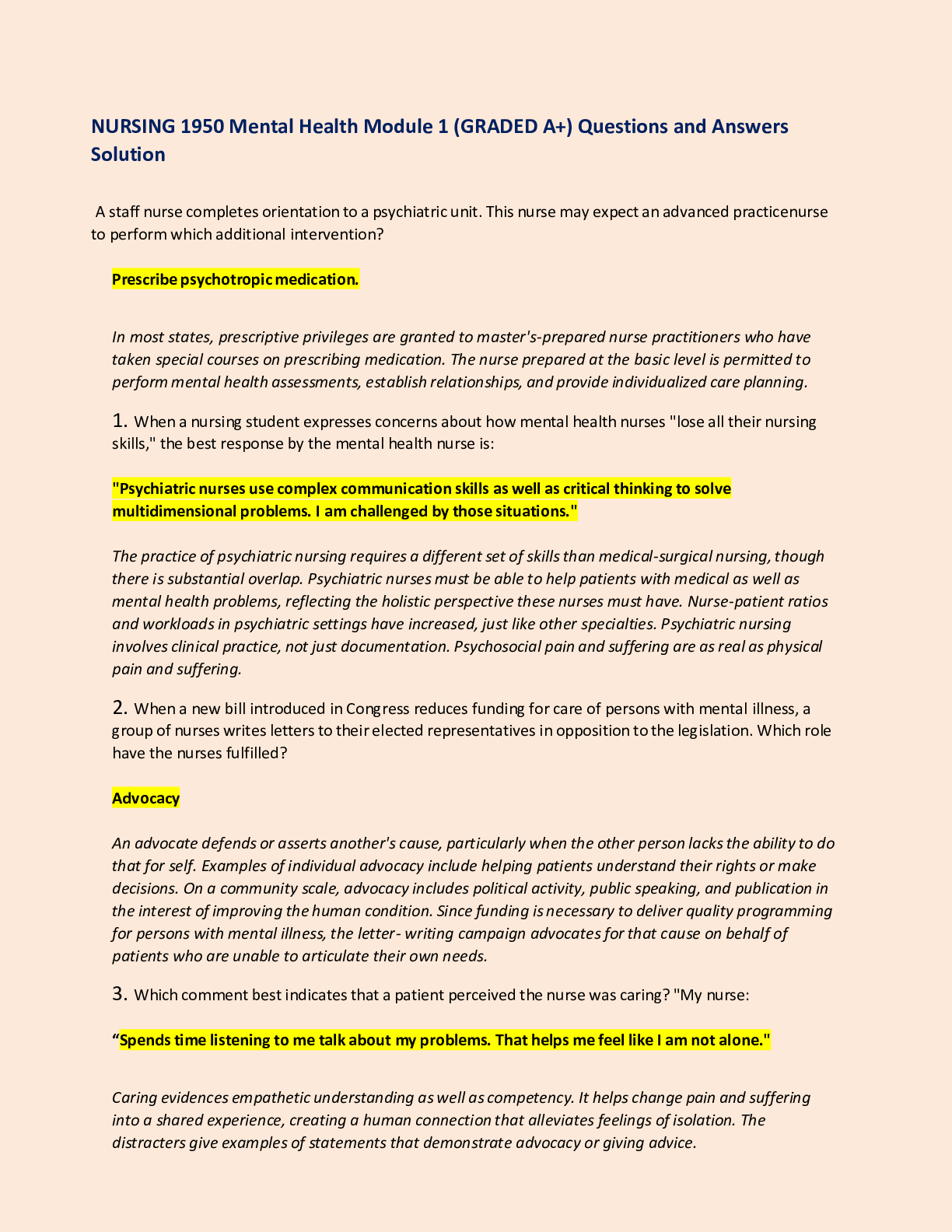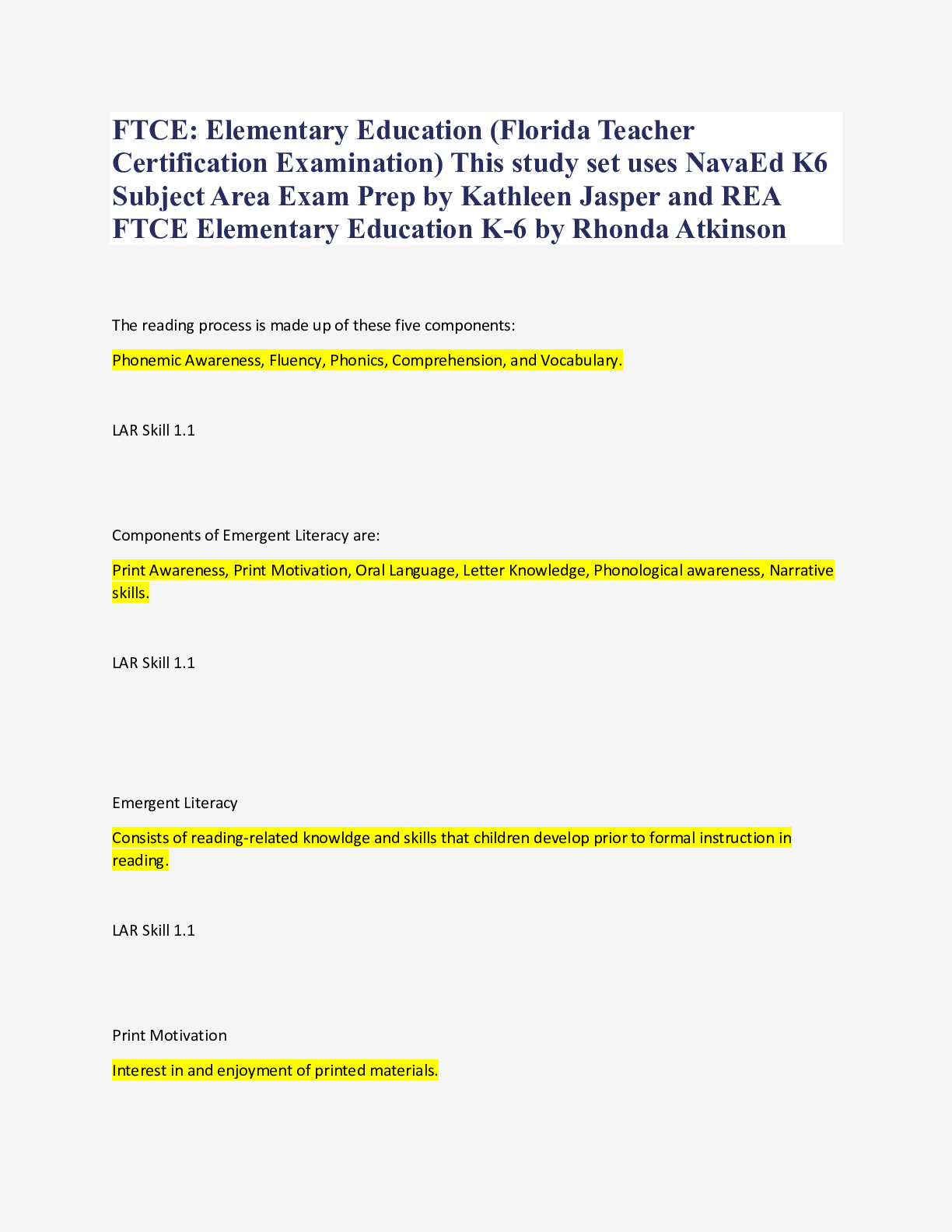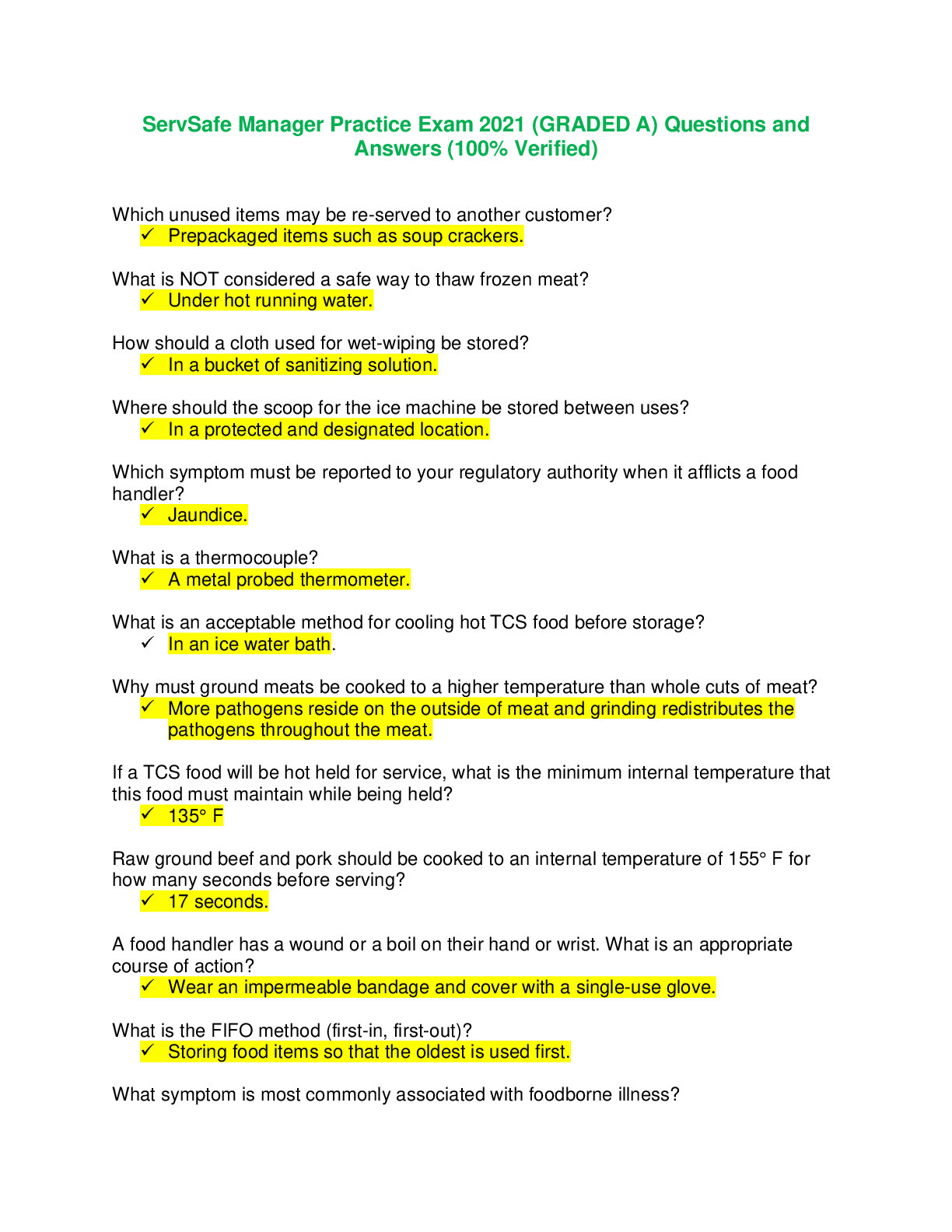*NURSING > EXAM > Nursing 1950 Mental Health Module 6 (RATED A+) Questions and Answers Solution/ Download To Score An (All)
Nursing 1950 Mental Health Module 6 (RATED A+) Questions and Answers Solution/ Download To Score An A
Document Content and Description Below
Nursing 1950 Mental Health Module 6 (RATED A+) Questions and Answers Solution 1. Which factor presents the highest risk for a child to develop a psychiatric disorder? Living with an alcoho... lic parent 2. Which nursing diagnosis is universally applicable for children diagnosed with autism spectrum disorders? Impaired social interaction related to difficulty relating to others 3. Which behavior indicates that the treatment plan for a child diagnosed with an autism spectrum disorder was effective? The child: holds the parent's hand while walking 4. A kindergartener is disruptive in class. This child is unable to sit for expected lengths of time, inattentive to the teacher, screams while the teacher is talking, and is aggressive toward other children. The nurse plans interventions designed to: reduce loneliness and increase self-esteem 5. A nurse will prepare teaching materials for the parents of a child newly diagnosed with attention deficit hyperactivity disorder (ADHD). Which medication will the information focus on? Methyphenidate (Ritalin) 6. What is the nurse's priority focused assessment for side effects in a child taking methylphenidate (Ritalin) for attention deficit hyperactivity disorder (ADHD)? Sleep disturbances and weight loss 7. A desired outcome for a 12-year-old diagnosed with attention deficit hyperactivity disorder (ADHD) is to improve relationships with other children. Which treatment modality should the nurse suggest for the plan of care? Social skills group 8. The parent of a 6-year-old says, "My child is in constant motion and talks all the time. My child isn't interested in toys but is out of bed every morning before me." The child's behavior is most consistent with diagnostic criteria for: attention deficit hyperactivity disorder 9. A child diagnosed with attention deficit hyperactivity disorder had this nursing diagnosis: impaired social interaction related to excessive neuronal activity as evidenced by aggression and demanding behavior with others. Which finding indicates the plan of care was effective? The child: engages in cooperative play with other children 10. When a 5-year-old diagnosed with attention deficit hyperactivity disorder (ADHD) bounces out of a chair and runs over and slaps another child, what is the nurse's best action? Take the aggressive child to another room 11. A child diagnosed with attention deficit hyperactivity disorder will begin medication therapy. The nurse should prepare a plan to teach the family about which classification of medications? Central nervous system stimulants 12. Soon after parents announced they were divorcing, a child stopped participating in sports, sat alone at lunch, and avoided former friends. The child told the school nurse, "If my parents loved me, they would work out their problems." Which nursing diagnosis has the highest priority? Social isolation 13. A nurse assesses a 3-year-old diagnosed with an autism spectrum disorder. Which finding is most associated with the child's disorder? The child: continuously rocks in place for 30 minutes 14. A 4-year-old cries for 5 minutes when the parents leave the child at preschool. The parents ask the nurse, "What should we do?" Select the nurse's best response. Give your child a kiss before you leave the preschool program 15. Which assessment finding would cause the nurse to consider a child to be most at risk for the development of mental illness? The child has been raised by a parent with chronic major depression 16. The child prescribed an antipsychotic medication to manage violent behavior is one most likely diagnosed with: attention deficit hyperactivity disorder 17. A child reports to the school nurse of being verbally bullied by an aggressive classmate. What is the nurse's best first action? Encourage the victimized child to share feelings about the experience 18. Assessment data for a 7-year-old reveals an inability to take turns, blurting out answers to questions before a question is complete, and frequently interrupting others' conversations. How should the nurse document these behaviors? Impulsivity 19. A child diagnosed with attention deficit hyperactivity disorder (ADHD) shows hyperactivity, aggression, and impaired play. The health care provider prescribed amphetamine salts (Adderall). The nurse should monitor for which desired behavior? Improved abilities to participate in cooperative play with other children 20. When group therapy is prescribed as a treatment modality, the nurse would suggest placement of a 9-year-old in a group that uses: play and talk about a play activity 21. Which child demonstrates behaviors indicative of a neurodevelopmental disorder? A 3-year-old who is mute, passive toward adults, and twirls while walking 22. The parent of a child diagnosed with Tourette's disorder says to the nurse, "I think my child is faking the tics because they come and go." Which response by the nurse is accurate? "Tics often change frequency or severity. That doesn't mean they aren't real." 23. When a 5-year-old is disruptive, the nurse says, "You must take a time-out." The expectation is that the child will: sit on the edge of the activity until able to regain self-control 24. A parent diagnosed with schizophrenia and 13-year-old child live in a homeless shelter. The child formed a trusting relationship with a shelter volunteer. The child says, "My three friends and I got an A on our school science project." The nurse can assess that the child: displays resiliency 25. A nurse prepares to lead a discussion at a community health center regarding children's health problems. The nurse wants to use current terminology when discussing these issues. Which terms are appropriate for the nurse to use? Select all that apply. -Bullying -Autism spectrum disorder -Intellectual development disorder 26. A nurse prepares the plan of care for a 15-year-old diagnosed with moderate intellectual developmental disorder. What are the highest outcomes that are realistic for this patient? Within 5 years, the patient will: (select all that apply) -independently perform own personal hygiene -obtain employment in a local sheltered workshop -correctly use public buses to travel in the community 27. At the time of a home visit, the nurse notices that each parent and child in a family has his or her own personal online communication device. Each member of the family is in a different area of the home. Which nursing actions are appropriate? Select all that apply. -Educate all members of the family about risks associated with cyberbullying -Talk with the parents about parental controls on the children's communication devices -Encourage the family to schedule daily time together without communication devices 28. A nurse works with a child who is sad and irritable because the child's parents are divorcing. Why is establishing a therapeutic alliance with this child a priority? Acceptance and trust convey feelings of security to the child 29. A 16-year-old diagnosed with a conduct disorder has been in a residential program for 3 months. Which outcome should occur before discharge? The adolescent and parents create and agree to a behavioral contract with rules, rewards, and consequences 30. A 15-year-old ran away from home six times and was arrested for shoplifting. The parents told the court, "We can't manage our teenager." The adolescent is physically abusive to the mother and defiant with the father. Which diagnosis is supported by this adolescent's behavior? Conduct disorder 31. A 15-year-old was placed in a residential program after truancy, running away, and an arrest for theft. At the program, the adolescent refused to join in planned activities and pushed a staff member, causing a fall. Which approach by nursing staff will be most therapeutic? Establish firm limits 32. An adolescent was arrested for prostitution and assault on a parent. The adolescent says, "I hate my parents. They focus all attention on my brother, who's perfect in their eyes." Which type of therapy might promote the greatest change in the adolescent's behavior? Family therapy 33. An adolescent was arrested for prostitution and assault on a parent. The adolescent says, "I hate my parents. They focus all attention on my brother, who's perfect in their eyes." Which nursing diagnosis is most applicable? Ineffective coping related to inappropriate methods of seeking parental attention as evidenced by acting out 34. A 12-year-old has engaged in bullying for several years. The parents say, "We can't believe anything our child says." Recently this child shot a dog with a pellet gun and set fire to a neighbor's trash bin. The child's behaviors support the diagnosis of: conduct disorder 35. An 11-year-old diagnosed with oppositional defiant disorder becomes angry over the rules at a residential treatment program and begins cursing at the nurse. Select the best method for the nurse to defuse the situation. Accompany the child to the gym and shoot baskets 36. An adolescent acts out in disruptive ways. When this adolescent threatens to throw a pool ball at another adolescent, which comment by the nurse would set appropriate limits? "Do not throw the ball. Put it back on the pool table." 37. The family of a child diagnosed with an impulse control disorder needs help to function more adaptively. Which aspect of the child's plan of care will be provided by an advanced practice nurse rather than a staff nurse? Dialectical behavioral therapy (DBT) 38. Shortly after the parents announced that they were divorcing, a 15-year-old became truant from school and assaulted a friend. The adolescent told the school nurse, "I'd rather stay in my room and listen to music. It's easier than thinking about what is happening in my family." Which nursing diagnosis is most applicable? Ineffective coping related to adjustment to changes in family relationships 39. A child known as the neighborhood bully says, "Nobody can tell me what to do." After receiving a poor grade on a science project, this child secretly loaded a virus on the teacher's computer. These behaviors support a diagnosis of: oppositional defiant disorder 40. An 11-year-old diagnosed with oppositional defiant disorder becomes angry over the rules at a residential treatment program and begins shouting at the nurse. What is the nurse's initial action to defuse the situation? Take the child swimming at the program's pool 41. Parents of an adolescent diagnosed with a conduct disorder say, "We don't know how to respond when our child breaks the rules in our house. Is there any treatment that might help us?" Which therapy is likely to be helpful for these parents? Parent-child interaction therapy (PCIT) 42. An adolescent diagnosed with an impulse control disorder said, "I just want to die. I spend all my time getting even with people who have done wrong to me." When asked about a suicide plan, the adolescent replied, "I'll jump from the bridge near my home. My father threw kittens off that bridge, and they died because they couldn't swim." Rate the suicide risk. High 43. An adolescent diagnosed with conduct disorder has aggression, impulsivity, hyperactivity, and mood symptoms. The treatment team believes this adolescent may benefit from medication. The nurse anticipates the health care provider will prescribe which type of medication? Second-generation antipsychotic 44. An adolescent was recently diagnosed with oppositional defiant disorder. The parents say to the nurse, "Isn't there some medication that will help with this problem?" Select the nurse's best response. "Medication is usually not prescribed for this problem. Let's discuss some behavioral strategies you can use." 45. An adolescent diagnosed with a conduct disorder stole and wrecked a neighbor's motorcycle. Afterward, the adolescent was confronted about the behavior but expressed no remorse. Which variation in the central nervous system best explains the adolescent's reaction? Reduced gray matter in the cortex and dysfunction of the amygdala results in decreased feelings of empathy 46. Which assessment findings support a diagnosis of oppositional defiant disorder? Negative, hostile, and spiteful toward parents. Blames others for misbehavior 47. A nurse on an adolescent psychiatric unit assesses a newly admitted 14-year- old. An impulse control disorder is suspected. Which aspects of the patient's history support the suspected diagnosis? Select all that apply. -Family history of mental illness -Father with history of alcohol abuse -History of an abusive relationship with one parent 48. What are the primary distinguishing factors between the behavior of persons diagnosed with oppositional defiant disorder (ODD) and those with conduct disorder (CD)? Select all that apply. The person diagnosed with: ODD tests limits and disobeys authority figures CD often violates the rights of others 49. A nurse works with an adolescent who was placed in a residential program after multiple episodes of violence at school. Establishing rapport with this adolescent is a priority because: (select all that apply) -a therapeutic alliance is the first step in a nurse's therapeutic use of self -acceptance and trust convey feelings of security for the adolescent 50. A nurse suspects that her next-door neighbor, an older woman, is a victim of elder abuse by her daughter. What is the appropriate action for the nurse to do in this situation? Complete a confidential report with the adult protective services in the area 51. The nurse is providing care to a client diagnosed with dementia. What option is an example of the appropriate use of implied consent by the nurse? Changing the client's dressing when the client asks, "Will you change this bandage now?" 52. Which option is an example of elder exploitation? A homebound client can only get groceries by agreeing to pay for her neighbor's groceries, too 53. A frail, elderly widow is admitted to the hospital after sustaining a fall. The client lives alone and has no living relatives. After cognitive testing reveals mild cognitive impairment, the interdisciplinary team on the Acute Care for the Elderly Unit recommends long-term care placement and that a durable power of attorney for health care (DPOA-HC) be established. When the client seems confused over what a DPOA-HC's responsibilities are, the nurse responds that: "A DPOA-HC is a person you name to make health care decisions for you when you can't make them for yourself." 54. Which of the following statements made by a family caregiver would a nurse consider most indicative of elder abuse? "My dad wanders at night and I can't be bothered with him. I mix sleeping pills in his dinner so that he will fall asleep." 55. An older woman tearfully tells a nurse, "I must buy my neighbor all of his groceries, or he will not drive me to the store or the doctor." This is an example of which type of elder mistreatment? Financial exploitation 56. When a cognitively impaired, wealthy, white client is noted to have burns on her upper back, her son states that the patient burned herself when attempting to shower. Which statement by a member of the team reflects a need for further education on elder abuse? (Select all that apply.) -"She is wealthy; abuse does not happen in people of financial means." -"The client is white and race places an important role in who is likely to be abused." 57. A nurse is preparing education for a group of older adults and caregivers at a senior center on elder abuse. The nurse is preparing to discuss seniors who are more likely to be abused or neglected. The nurse includes which of the following? (Select all that apply.) -Individuals with cognitive impairment -Individuals who abused the caregiver earlier in life -Individuals who live in an institutional setting 58. A nurse working in an emergency department is caring for an 89-year-old woman who was brought to the hospital by her daughter for a fracture of the right arm. The woman is wheelchair dependent and lives with her widowed daughter who is the primary caregiver. The daughter states that her mother got up out of the wheelchair unassisted to go to the bathroom and fell. The patient cannot recall the circumstances of the fall. The patient is weeping and cradling her right arm. The patient's history reveals two previous wrist fractures over the course of the past year. The nurse notes several large ecchymotic areas on the right hand and left arm and on the left side of the body and the back. The ecchymoses are in various stages of healing. Upon assessment, the patient is non-weight-bearing (NWB). The nurse suspects physical abuse based on which of the following findings? (Select all that apply.) -Bruises are in various stages of healing -The fracture is inconsistent with the patient's functional ability 59. A nurse suspects elder mistreatment in which of the following patients seen in the emergency department? (Select all that apply.) An 86-year-old female nursing home resident admitted to the hospital with vaginal bleeding and three large bruises on her inner thigh A 69-year-old man with a history of diabetes who is admitted for diabetic foot ulcers wearing dirty clothing and smells like urine [Show More]
Last updated: 2 years ago
Preview 1 out of 10 pages

Buy this document to get the full access instantly
Instant Download Access after purchase
Buy NowInstant download
We Accept:

Also available in bundle (1)

Nursing 1950 Mental Health Module BUNDLE Exams 1-6 with Questions and Answers- SRTC
Nursing 1950 Mental Health Module BUNDLE Exams 1-6 with Questions and Answers- SRTC
By Goodluck Academia 3 years ago
$14.5
6
Reviews( 0 )
$12.50
Can't find what you want? Try our AI powered Search
Document information
Connected school, study & course
About the document
Uploaded On
Jun 24, 2021
Number of pages
10
Written in
Additional information
This document has been written for:
Uploaded
Jun 24, 2021
Downloads
0
Views
93



 Questions and Answers 100% VERIFIED.png)
 Questions and Answers 100% correct Solutions.png)






.png)














